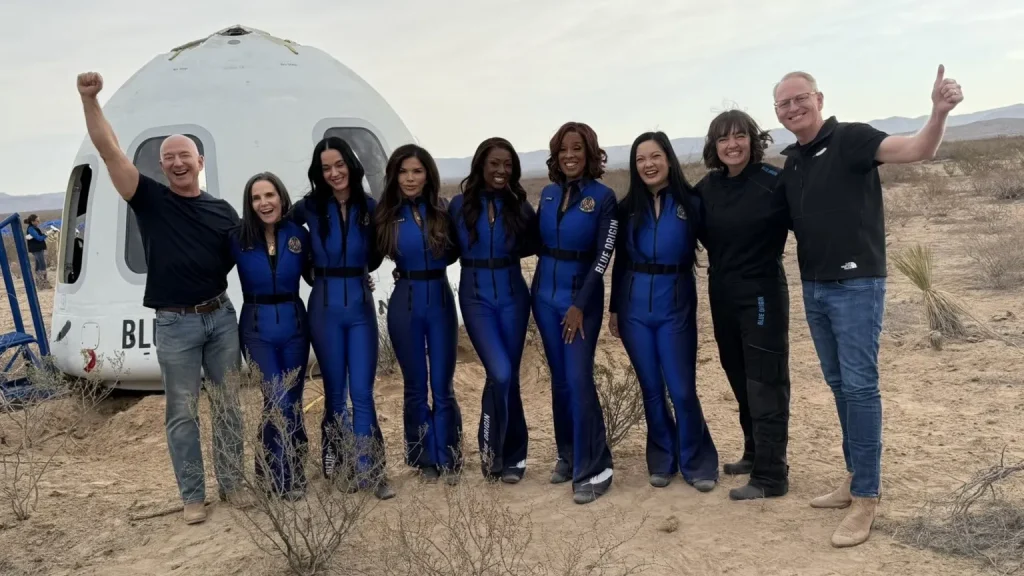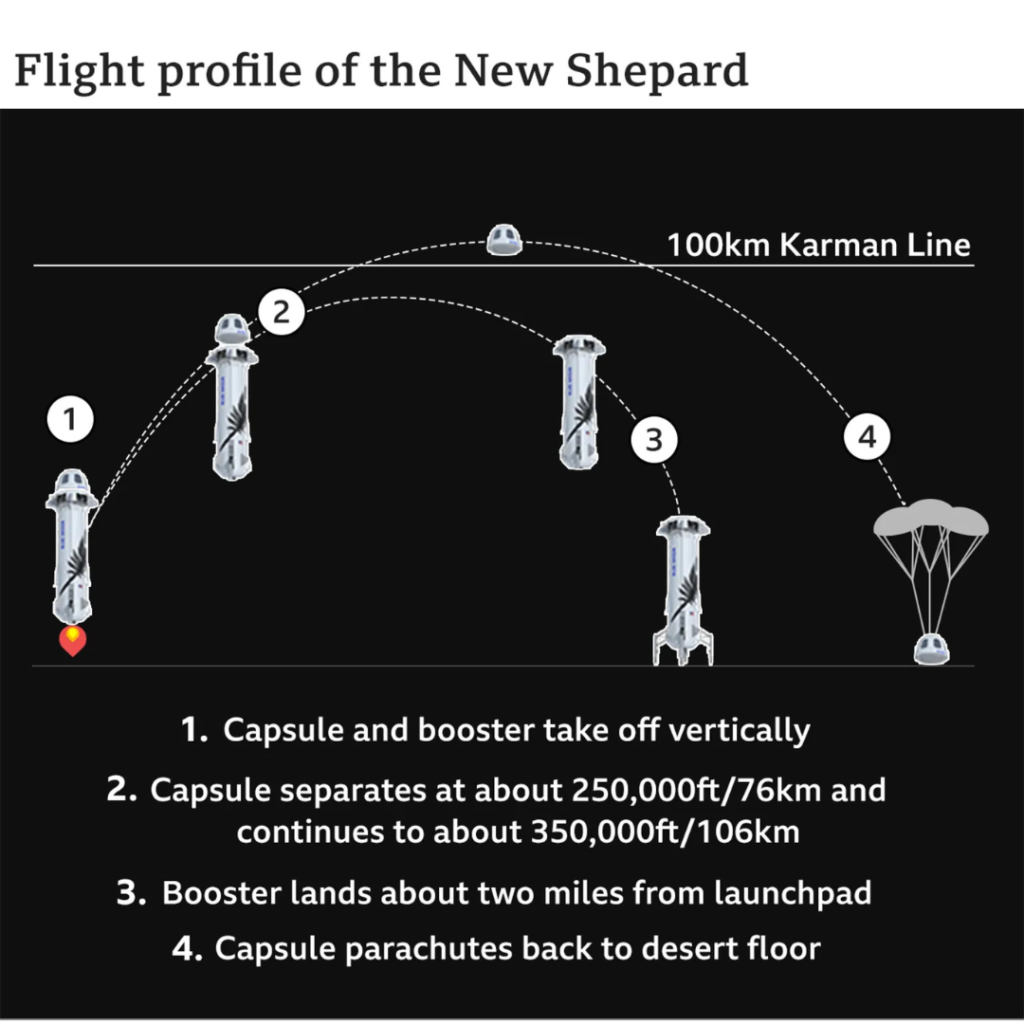Blue Origin’s all-female crew makes a safe return to Earth.
Katy Perry and five women safely returned to Earth after soaring to space aboard Jeff Bezos’s Blue Origin rocket. The group, including Bezos’s fiancée Lauren Sánchez and CBS’s Gayle King, enjoyed a special moment with Perry singing “What a Wonderful World.” After the 11-minute flight, which took them over 100km (62 miles) above Earth, Perry shared feeling “super connected to life” and “love.”

Onboard were former NASA rocket scientist Aisha Bowe, civil rights activist Amanda Nguyen, and film producer Kerianne Flynn.
The New Shepard rocket launched from West Texas at 08:30 local time (14:30 BST) and returned with a parachute-assisted soft landing, while the rocket booster also touched down in Texas.
Cheers filled the capsule as the recovery crew arrived. Jeff Bezos opened the door to welcome Lauren Sánchez, the first to exit.
“I’m so proud of this crew,” she said, tearfully. “I can’t put it into words.” She added, “We saw the moon, and Earth looked so quiet—but really alive.”
Next, Katy Perry kissed the ground and raised a daisy to the sky, a tribute to her daughter, Daisy.
Gayle King knelt down and kissed the ground, saying, “I just want to have a moment with the ground, just appreciate it for a second.”
The last to exit, Kerianne Flynn pointed to the sky and shouted, “I went to space.”
A celebrity crowd had gathered to watch the launch. From the viewing platform, Khloé Kardashian shared, “I didn’t realize how emotional it would be—it’s hard to explain. I have all this adrenaline, and I’m just standing here.”

“Whatever you dream of is within reach, especially today,” she continued. “Dream big, wish for the stars, and maybe one day, you could be among them.”
Oprah Winfrey shared her thoughts on her friend Gayle King, revealing that she’s a nervous flier.
“For Gayle—whew—anytime we’re on a flight, she’s in someone’s lap at the slightest turbulence. She really struggles with flying anxiety. And this… this is her conquering a huge fear,” Oprah said.
The spacecraft was fully autonomous, with no pilots onboard, and the crew did not control the vehicle.
The last all-female spaceflight was over 60 years ago when Soviet Cosmonaut Valentina Tereshkova became the first woman to solo space travel aboard Vostok 6. Since then, no other all-female flights have taken place, though women have made many vital contributions.
As the space tourism industry is still in its early stages, each successful launch is important, showing that these short, commercial flights can be carried out safely.
Some critics argue that these flights are tourism, not space science, with professional astronauts conducting missions for the greater good of humanity.
“A celebrity isn’t an envoy of humankind—they go to space for their own reasons,” said Dr. Kai-Uwe Schrogl, special advisor for political affairs at the European Space Agency, to BBC News.
“While these flights are exciting, they may also frustrate space scientists,” he added. “We see space travel as a tool for science, knowledge, and humanity’s interests, while celebrities do it for fun, gaining far more attention than regular astronauts.”
The flight sparked a range of reactions on social media, from excitement to criticism.
Dr. Tanya Harrison from the Outer Space Institute remarked, “A lot of the comments I saw online were things like, ‘It’s like the Real Housewives go to Mars,’ or ‘It’s the oligarchy in space—read the room, the timing is awful.’
But Dr. Harrison pointed out, “There were also plenty of positive reactions. People were saying, ‘Oh, this is so cool. Katy Perry is going to space.'”
Having worked on NASA’s Mars missions, she added, “The cynical side of me calls it a marketing stunt. It’s a company promoting that they can send tourists into space.”
However, she acknowledged that the all-female team could “shift the demographics” of who might be interested in such missions. “Socially, they might have had some impact,” she said.
During a news conference after the flight, two of the women addressed some of the criticism, such as concerns about the cost.
“I feel like anyone criticizing doesn’t fully understand what’s happening here,” said Gayle King.
She shared that the astronauts had received an overwhelmingly positive response, especially from young women and girls.
Lauren Sánchez added that the criticism fired her up, and she invited critics to visit Blue Origin to meet the thousands of employees who “put their heart and soul into these missions.”
Blue Origin, the private space company founded in 2000 by Amazon billionaire Jeff Bezos, is making waves in space tourism.
While full ticket prices haven’t been disclosed, a $150,000 (£114,575.85) deposit is required to reserve a seat, highlighting the exclusivity of these early flights.
In addition to its suborbital tourism, Blue Origin is also working on long-term space infrastructure, such as reusable rockets and lunar landing systems.
The New Shepard rocket is designed to be fully reusable, with its booster returning to the launch pad for vertical landings after each flight, helping to reduce costs.
Under US law, astronauts must undergo thorough training for their specific roles. Blue Origin states that New Shepard passengers are trained over two days, focusing on physical fitness, emergency protocols, and safety measures for zero gravity.
Additionally, there are two support members, known as Crew Member Seven: one offers continuous guidance to astronauts, while the other maintains communication from the control room during the mission.
The growth of space tourism has sparked criticism over its exclusivity and potential environmental impact.
Supporters, however, argue that private companies are driving innovation and making space more accessible.
Professor Brian Cox stated in 2024, “Our civilization needs to expand beyond our planet for so many reasons,” adding that collaboration between NASA and private firms is a positive move.
Rocket engine exhaust releases gases and particles that can negatively impact Earth’s climate and ozone layer.
On its website, under the heading “Protecting our Planet,” Blue Origin claims that “the only byproduct of New Shepard’s engine combustion is water vapor with no carbon emissions.”
However, Eloise Marais, a professor of Atmospheric Chemistry and Air Quality at University College London, points out that water vapor is also a greenhouse gas and is not meant to be in the upper layers of the atmosphere.
“It alters the chemistry of the stratosphere, depleting the ozone layer and forming clouds that affect climate,” she explains.
Experts warn that as more rockets are launched, the risk to the ozone layer grows.



